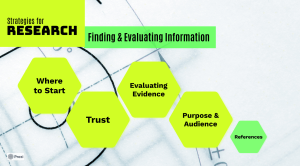9 Strategies for Research
Learning Objectives
-
Explore strategies for conducting research, evaluating evidence, and engaging in media literacy.
-
Evaluate arguments in a text, including the validity of the reasoning, and the relevance and sufficiency of the evidence.
Chapter & Discussion
This chapter includes a presentation that can be navigated in a classroom setting or independently. You can access the presentation via the link below.
Strategies for Research: Finding and Evaluating Information
Work through the different sections of the chapter and discuss ideas and topics as they arise. If you’re working independently, take notes instead. Notes and active discussion will be helpful in navigating this week’s assignments.
Where to Start
In college and the workforce, you will often be asked to defend your ideas. To do this, you’ll need to build a case for them with arguments and evidence.
The evidence you provide should come from research.
There is a lot of information available (especially digitally) and it can be difficult to determine:
- Which sources you trust
- How to tell good evidence from bad evidence
- And the purpose and audience of a source
Literally, Where to Start
- An encyclopedia (like Wikipedia) is actually a great place to start your research because it provides general knowledge of topics. It also provides sources and further reading.
- Find media that also has a print version; these sources have more likelihood of being trustworthy
- Make use of the library and your digital library access (such as JSTOR)
- Rule out search items that you can’t trust, such as clickbait, social media posts, and personal websites
Determining Trust
It can be difficult to determine whether or not a source is credible or trustworthy. When researching, there are a few strategies that can help.
- Lateral Reading is the act of checking sources for credibility as you read them. You can use newspaper articles and fact-checking sites like Politifact and Snopes for this.
- Try to determine the authority of an author by finding out their professional background, the process they used to produce the information, and whether they have systems in place to catch mistakes.
- Try to determine the perspective of an author: consider their reason for sharing the information and how their views might influence their writing.

Evaluating Evidence
When researching, you will need to evaluate the evidence that sources provide to defend their claims. Here are a few questions to ask yourself:
Does the author cite credible sources?
Check the citations and make sure they come from trusted institutions.
Is there context for the evidence they provide and is it relevant to their case?
The author should provide context in the form of similar evidence from other, unbiased sources. It should also feel relevant to the issue at hand.
How easy would it be to fact check?
Credible sources are easy to fact check. If you can’t find anything to back it up, it might not be trustworthy.
Determining Purpose and Audience
Two final things to consider when evaluating information are purpose and audience.
Purpose is the intention of the author in writing this work. It can also mean the type of writing, such as a scientific paper, an email to your co-worker, or a cover letter.
Audience is who this writing is intended for. Scientific papers are often intended for people in a specific field, whereas the newspaper is intended for the public.
Considering who this is for and why it was written can help you determine how useful the source is in your research.

Assigned Reading
Here are this week’s readings. Additionally, please read for your own personal enjoyment for 1/2 hour each day. This will be called your “Reading Zone” reading and it will coincide with many upcoming activities.
Evaluating Evidence by John Green (via Crash Course)
Problem Set: Practice Your Skills!
Click here to complete a ten-question problem set on concepts in this chapter.
Completing problem sets like this can be an important element of independent study towards completing your HSE. I write these to resemble the style of questions you’ll find on the Reading and Language Arts GED.
Assignment: Evaluating Evidence (250 Words)
Watch Crash Course: Navigating Digital Information- Evaluating Evidence.
For this discussion, I’d like you to think about two things:
-
A fact that you are 100% sure about
-
Something you’ve heard but have never looked up
Now, I’d like you to look up both. What is the best evidence you could find on your facts? Which had a better body of evidence? How do you know? Did one of your facts turn out to be false?
Assignment: Reading Zone Response (250 Words)
For Reading Zone, you must find a novel that is interesting to you and enjoyable to read. If you need help finding a Reading Zone book, please ask. Please read your Reading Zone book for a half-hour each day. On class days, there will be time in class dedicated to reading.
Create a response to this week’s reading that addresses the following prompts:
-
In one paragraph, summarize what you’ve read this week
-
In a second paragraph, discuss the communication style of one or two of the characters in your book.
Attributions
Crash Course: Navigating Digital Information- Who Can You Trust?
Crash Course: Navigating Digital Information- Evaluating Evidence


